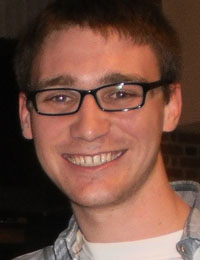"A Language Transcendent"
by J.T. Fales '12
 我的
我的
巴勒斯坦权力机构
With so many channels facilitating our interactions, it hardly occurred to me that we had never actually “met” in the traditional sense of the term. I’d never shaken his hand; the “air-high fives” we exchanged never met their targets. And yet, I knew him. He was a friend of mine, whom I enjoyed spending time with as much as anyone on campus. I found myself picturing him here in Williamsburg, what I would show him and who I’d introduce him to, and how we’d laughingly struggle to communicate the entire time.
Th
在
Like many of my friends who visited for the novelty of the experience, I began to experiment with Chatroulette. I saw the concerns of the media, but I judged them to be vastly overblown. Any “danger” they declared was fictitious. The site’s reputation was clear – no one visited Chatroulette without knowing what they were getting into. What was to the media a wilderness of humanity, a threat to be feared because it brought contact with the unknown, was to me and others a new platform of communication and connection, a bridge through cyberspace to other people and other worlds. And I judged correctly: it was through Chatroulette that I had met Paulo.
妈
One day, Paulo IMed me, excited to tell me about a trip he had taken to a nearby city to hang out with a friend he had met online. The warning flags from my childhood were immediately raised: Who was this person he’d met? How did he know it was safe to meet them? What if the person wasn’t who they claimed to be? What if something happened to Paulo?
He insisted that he was sure the person was who they claimed to be: after meeting online, they had exchanged text messages for quite some time and had struck up a friendship not unlike our own. To Paulo, meeting this person and hanging out with them was a natural progression of the relationship. Why wouldn’t it be?
I saw his logic, but I was still concerned. “Was it a hook up?” I asked nervously. He laughed and said no, but admitted that he had hooked up with people he’d met online before.
“Isn’t that dangerous?” I asked. I was beginning to conclude that Paulo might have been trusting and romantic to the point of naivety.
He shrugged off my question. “People do this all the time in Brazil,” he said. “We know the dangers, but we don’t let it stop us from making the most of the opportunities we have.”
Put like that, his attitude sounded more like cautious optimism than innocence. After all, does it really make sense to presume that most people online are not who they claim to be, or have sinister intentions?
Paulo wasn’t being naïve. I was being paranoid. My culture had raised me to suspect the worst of people online, and the result of that priming was constant fear, suspicion, and second-guessing. On the other side of my computer screen, I saw the mirror image of my world. Here was someone who saw the internet as a garden for creating, nurturing, and strengthening relationships. To him – and to Brazilian culture generally, as Paulo saw it – the internet was a tool, not a weapon. Like any tool, it has been and will be used for evil by a very few people, relatively speaking. Yet, their unscrupulous actions should not taint the idea of the whole. I thought about how I had found Chatroulette to be a haven of possibilities, despite what our culture had warned me about it. I began to look at the internet differently, too.
Some weeks later, Paulo told me that he would like to visit me in the US. He had never been. He was very excited about the prospect of experiencing the culture here first-hand while spending time together with me. But despite what I had come to realize about the internet’s power to connect people, despite my sure sense of Paulo as a person and friend, despite the time I myself had spent fantasizing about exactly such a visit – when the real possibility was put before me, I balked.
I told him that Williamsburg was a strange little corner of the country to visit – he should go somewhere more exciting, like New York or Washington. But he wanted to learn through me. I pointed out that communication would be difficult without the computer between us. In a weird way, the internet that kept us so far apart was what allowed us to have a friendship at all. He simply smiled and suggested that some activities didn’t need words.
But even in the face of temptation, I still couldn’t think of it. I would have to introduce him to all my friends, and what would I say? “This is my friend Paulo. We met online. He doesn’t speak English, but he flew here to visit me.” Whatever the reality of our relationship, everyone would see him as one thing: the Internet Hookup From Another Country. In their minds, I would suddenly be placed into the category of people desperate enough to solicit sex online – and desperate enough to fly him here to get it. How could I explain that it wasn’t like that? For all my new ideals about the great power of the internet to connect people, I was the only one who had experienced such a revelation. In the end I realized: I was afraid people would judge me.
Reluctantly, I conveyed all this to Paulo. I explained how our culture doesn’t look favorably upon internet-arranged meet-ups; that even though I really liked the idea of him visiting, frankly, I would be embarrassed by it. Admitting all of this to him was a painful trial. In a way, I was blocking the friendship from ever evolving. The implication was that our connection was not valid or deep enough to go any further than the two computer screens could allow. I signed off that night deeply disappointed that I couldn’t summon the courage to stick to my beliefs after all.
Yet the fault is not entirely my own: I am only a product of my age.
The relentless fearmongering by the media of our childhood has taken its toll. We have been raised to regard the most incredible invention of the last millennium with hostile suspicion, when we should be embracing it. Two of the most divisive forces in human history – language and distance – have become nearly obsolete, yet we are afraid to acknowledge their downfall. Our misguided xenophobia has come at the cost of the infinite relationships that could have thrived across languages and borders, yet never even got the chance to begin. As our generation takes its place as the drivers of public opinion and policy, we must resolve to overcome this stigma that has so suffocated our future. Only then we will be capable of appreciating the way in which the internet highlights the deep commonalities shared by all members the human race.
Paulo and I still talk from time to time on Facebook and Twitter. When I see his smile slide into my news feed, I feel as though he’s grinning wistfully at me, like an old crush waving fondly through a window. Maybe one day I’ll be able to tell him that my undersized self-confidence has finally grown to fit my big ideals. And maybe on that day, we can laugh with all our friends over the story of how we first met online, and celebrate the friendship that grew between two guys who never needed to meet to touch each other’s hearts.
* Above excerpt is from a piece awarded honorable mention in the Tiberius Gracchus Jones Prize category for best work of literary nonfiction as part of the 2012 English Literary Awards.
















